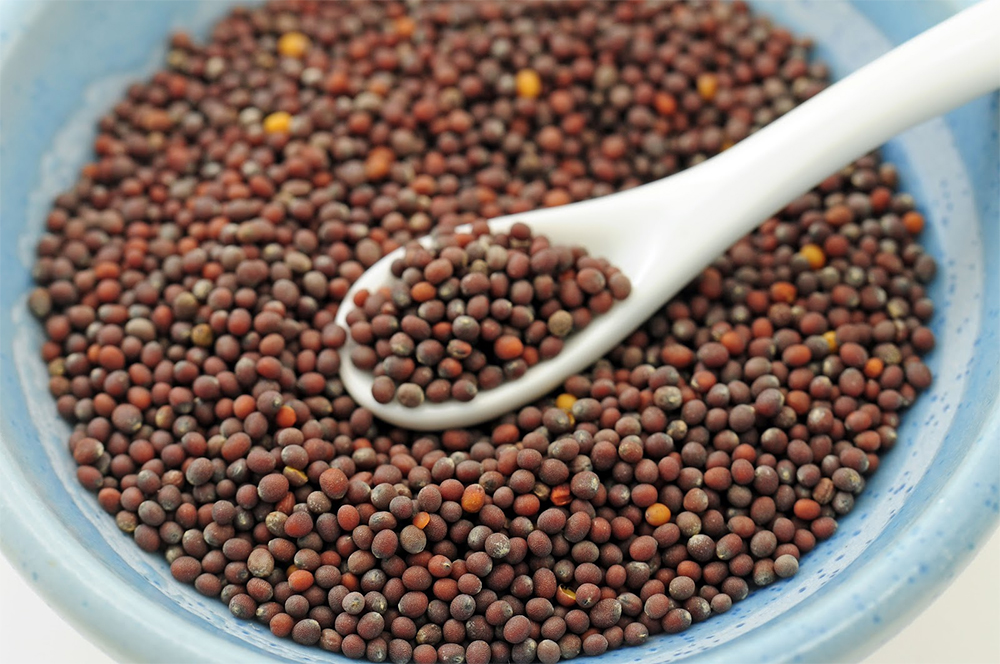
Discoveries at the Jungle: Mustard
Back to feed- Posted: 7/2/2018
- Categories: Discoveries at the Jungle
Mustard. The quintessential American condiment. We use it on hot dogs at the ballpark, drizzle it over hamburgers in our backyard cookouts, and most of us keep a squeeze bottle in the fridge for sticky situations, like when the delivery guy forgets to include our favorite sauce. Mustard is the second most-used spice in the United States, trailing just behind peppercorn, and it’s clear that America loves mustard. At Jungle Jim’s International Market, we share that love. That’s why our tantalizing mustard selection encompasses mustards from around the world and across the country! Here, you’ll find all varieties of yellow mustards, brown mustards, spicy mustards, honey mustards, barbecue mustards, mustard seeds, mustard powder, and some surprising new favorites. So, what’s so cool about mustard? We’ve got the scoop. Keep on scrolling and we’ll give you four facts about mustard that you probably didn’t know. Plus, the next time you’re at your in-laws for a family cookout, you can wow the family with a tidbit that you’ll learn here!
1 – Mustard has been used as a condiment for literally thousands of years. In fact, the Romans were likely the first group of people to experiment with mustard as a condiment. They mixed unfermented grape juice with ground mustard seeds to make “burning must,” or mustum ardens. Thus, mustard. Mustard actually appears in an anonymous Roman cookbook, De re coquinaria, that dates back to the 4th or 5th century.
2 – Grey Poupon, the high-class delicacy that inspired the iconic and oft-cited commercials, has become a cornerstone of American rap music. Yes, that’s right. Grey Poupon is pimpin’. Why’s that? Well, as Estelle Caswell and Sarah Frostenson of Vox explain in their video “Why Rappers Love Grey Poupon,” the French-style mustard has become a status symbol. With the premier of its first commercial in 1981, the Grey Poupon brand has marketed their mustard as a delicacy that is reserved for the upper echelon, essentially, a symbol of wealth. As early as 1992, American rappers have incorporated Grey Poupon into their lyrics, using it to reinforce their image of affluence. Alternatively, in songs about hard times, the mustard can be used to show contrast between two lifestyles, as in Kanye West’s rap in the 2007 “Southside”: “Back in college I had to get my back up off the futon […] / People asking him, ‘Do you have any Grey Poupon?’” That was in 2007, but you can find references to the Rolls-Royce of mustards in any number of rap songs from the 90s to the 2000s. The word is relatively easy to rhyme (i.e. rhymes with “coupon” or “futon”) and the more the phrase is used in rap, the more rappers continue to use it! With that, I’ll leave you with this diss from Dice Raw’s “100,” released in 2011: “Yeah, you’re like a half-off coupon / Me, I’m like a fresh jar of Grey Poupon.” Mic drop.
3 – Many people eat mustard for its health benefits! Mustard seeds are rich in calcium, magnesium, phosphorus, and potassium. The seeds also contain vitamin A and dietary folate. Back in the ancient world, mustard seeds (ground or whole) were used to treat anything, including hysteria, snake bites, and even the bubonic plague! We don’t recommend relying on mustard if a snake bites your or you somehow manage to contract the plague, but there are a few things mustard can do for your health! For one, spicy mustard is a great remedy for clogged sinuses. Mustard oil has also been known to relieve symptoms of the common cold, alleviate inflammation, and help clear the lungs. Some people have even reported that mustard seeds can help clear up acne!
4 – Over the ages, European monks have had a complicated relationship with mustard. In fact, mustard is kind of a thing due to the monks of Saint-Germain-des-Prés. Yes, that’s right. 10th century monks had a hand in the advent of mustard. It is believed that the Romans began exporting their mustard seeds to Gual around 900 CE, and the monks of Saint-Germain-des-Prés, in Paris, realized that they could quickly make a chunk of change by producing and marketing their own mustard. The monks mixed ground mustard seeds with must, or unfermented wine, which, again, resulted in mustum ardens, mustard! These Parisian monks helped to usher in a tradition of French mustard, including Dijon mustard. However, the Saint-Germain-des-Prés monks’ attitudes toward mustard was not universal, nor did it last. Several centuries later, during the middle ages, people commonly believed that mustard was an aphrodisiac! As a result, monks were forbidden from consuming mustard, for fear that they would fall prey to base desires! That tale actually inspired Kelly Davis, the founder of Lusty Monk mustards, a company that produces “robust mustards for the passionate palate,” to open her mustard business. If you’re interested in learning more about monks and mustard-making, stop by Jungle Jim’s and ask for the Lusty Monk Mustard. You won’t be disappointed!
Check out all of our Discover Mustard posts this month!
Discoveries at the Jungle Mustard: The Seeds and Powder
Discoveries at the Jungle: Mustards for Hot Dogs, Brats, and Sandwiches
Discoveries at the Jungle: French-style Mustards
Discoveries at the Jungle: Hot Mustards
Discoveries at the Jungle Mustard: The Relishes



